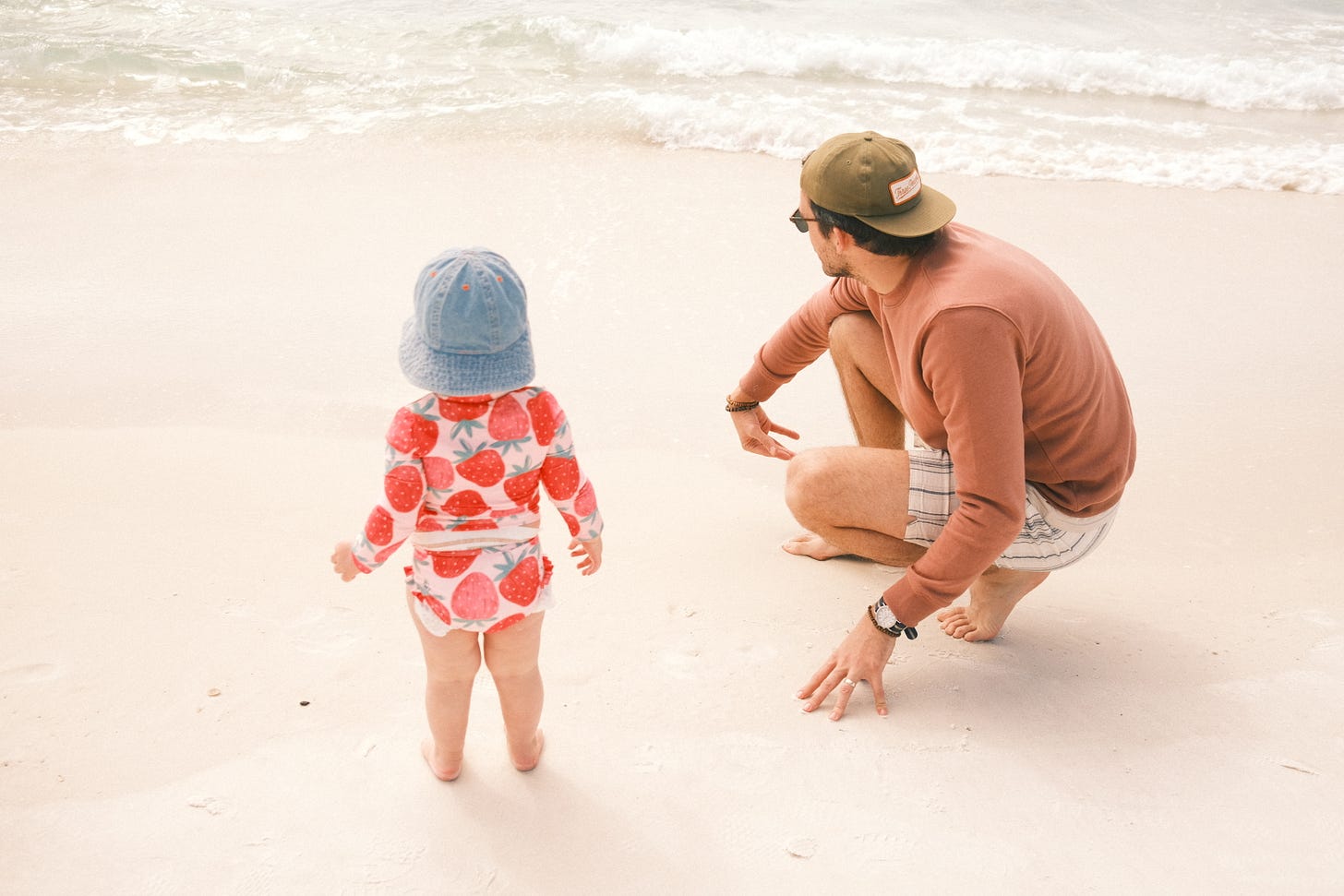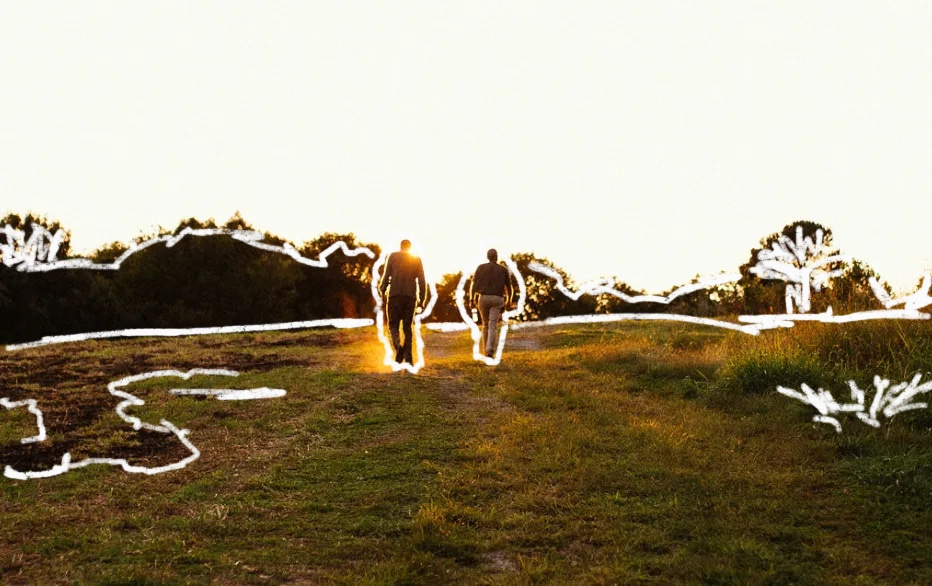You know that moment where you have a yearning desire for something intangible from someone? That strong feeling of wishing for something that you can’t have, you can’t get it easily, or you know that you won’t get it but you still long for it?
The words you ache to hear. The presence you long to experience. The soft gaze of a compassionate face that is like a hug to your soul. That feeling you get where it's like nothing else in the world matters in the moment because the connection you have with that person is like a taste of the Divine.
When those longings go unmet, we are left with a quiet ache.
A few days ago was Father’s Day. My third celebration of this special day. I wanted to write you a letter, but I just couldn’t get myself to do it. I made a short video instead, because somehow that was easier. The thing I love, and sometimes loathe, about longform writing is that it connects me with myself in a deep way. In a way that no other art form really does. Especially when what I’m writing about carries deep and complex feelings. Which is exactly what Father’s Day does for me.
It turned out this year that my wife had to leave early on Father’s Day morning for a work trip, so we celebrated the day before—which meant I had more time than usual to reflect on the actual day. During the few hours my daughter napped and then after she went to bed, I was alone.
I didn’t hear anything from my dad on Father’s Day.
And since I was alone, I had more time to notice how this impacted me because I wasn't distracted doing other stuff. Did I expect to hear from him? Honestly, no. We are essentially estranged right now and have been for years. I share this not because it’s unique, but because it’s not. We all carry places of ache. Relationships that don’t unfold how we hoped, love that doesn’t return in the way we need it to, moments that pass without the connection we longed for.
Not hearing from him was one of those strange I’m surprised but not surprised moments. And I could list a number of reasons why he probably didn’t say anything to me. That’s the complexity of it.
In the space of the unmet longing, we make up stories as a way to distract from, or minimize, the reality of the absence itself.
Of course we do—the absence can be so painful. But the absence is also the reality. And when we distract from reality, we rob ourselves of the opportunity to be embraced by Grace.
So in that quiet ache, we are faced with two decisions. We can turn away from the absence, or we can turn toward it. In my experience, it is much easier to turn away from the absence, but the act of doing that creates further distance between myself, others, and God.
If you’re new here, welcome! Each week you’ll get evidence-based insights and personal stories from a licensed therapist on healing attachment wounds, creativity and cultivating healthy relationships.
I know I’m being a bit ambiguous here, and that’s intentional. Because my absence, my unmet longing, may be very different from yours. But we have more in common than you may realize. Maybe you aren’t estranged from a family member, but I know that you are longing for something from someone. And I know that unmet longing leaves a quiet ache in its place. One that has been so quiet, you might just now be hearing it as you’re reading these words.
I want you to know that if you turn toward that ache, you might just find Love in a way you didn’t expect. The turning toward won’t be effortless, probably uncomfortable, and the longing still might go unmet. But the only thing you have control over is how you meet yourself in that place of longing.
says, “Every time we turn toward our pain with empathy and compassion—we’re already healing.” So, in the quiet ache of unmet longing, meeting yourself with empathy and compassion can be a balm to the soul.The ache might not go away. Not today. But you’re not alone in it, and I encourage you to turn toward it.
Because in the quiet ache of unmet longing, there is also a quiet invitation:
Come closer.
To yourself.
To the people who care about you and can meet you in the ache.
To the God who meets you in the absence.
With care,
Blake
Read more:
A Therapist's Guide to Navigating Complex Relationships with Parents
I was asked by Katrina Donham to write an article about parental estrangement for her new Therapist Spotlight series in her publication. It was a labor of love, as this topic is close to both my personal story and clinical experience. I hope you experience the same reaction she did: "I teared up at the end because what you've offered is hope, peace, and understanding…
A Therapist & A Theologian Walk Into A Bar
“If we really wanted to ruffle some feathers, we could collab and do something like ‘when a therapist and a theologian walk into a bar.’
There's an Epidemic Among Men
If you’re new here, welcome! Each week get evidence-based insights from a licensed therapist on healing attachment wounds, softening fear, and learning to trust again.









@Blake Roberts, LMFT - I bow to you as another human and fellow healer. The way you write and give shape to that quiet ache, naming the pull of unmet longings without rushing to resolve them feels, in my language, like a sacred kind of honesty.
I especially appreciate the reminder that turning toward absence, though painful, can open us to unexpected forms of grace. Your reflection holds space not just for grief, but for our own healing presence and that, from my way of listening, is a rare and powerful gift. For this, I am eternally grateful.
I really appreciated this. And I’m sorry so many of us feel that ache. I am currently in therapy (doing EMDR and other somatic work) for some childhood experiences that I am facing for the first time. It’s hard. It’s hard not to look away. But it’s also good and necessary. Neglect is painful, but learning how to care for needs—no matter how long after the fact it may be—is new for me. And I’m more hopeful now because of it. God fills in the gaps, the ache, with his quiet loving presence. I’m learning to notice this even on day when it feels like that ache may eat me alive. Anyway—keep writing! 😊